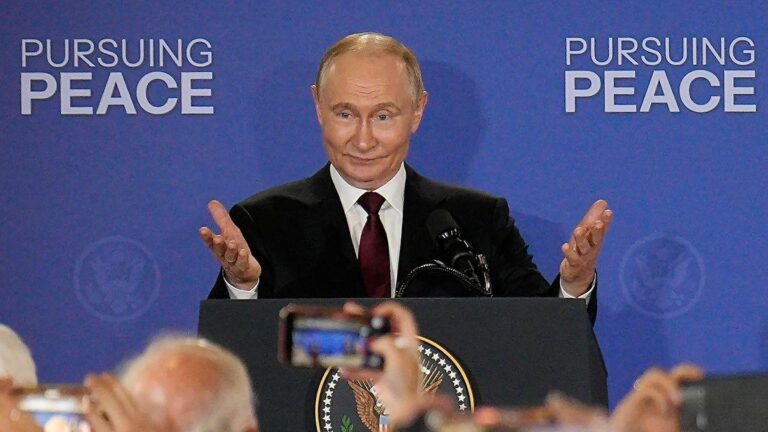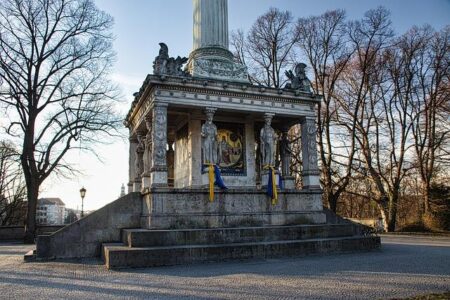In a recent analysis published by The New York Times, Russian President Vladimir Putin’s approach to Ukraine is examined through the prism of historical grievance and a perceived loss of national prestige. The article explores how Putin’s worldview, shaped by a narrative of Russia’s diminished influence since the Soviet era, continues to fuel tensions and shape policy toward Ukraine. This perspective offers critical insight into the enduring conflict and Moscow’s strategic calculations amid ongoing geopolitical shifts.
Putin’s Historical Narrative Shapes Russia’s Stance on Ukraine
President Vladimir Putin’s worldview is profoundly influenced by a historical narrative that emphasizes Russia’s perceived decline following the collapse of the Soviet Union. This narrative paints Ukraine not only as a critical piece of lost territory but as a symbol of Russia’s diminished stature on the world stage. Central to this perspective is the belief that Ukraine’s drift towards Western institutions represents an unacceptable erosion of Russia’s traditional sphere of influence and cultural identity. Within this framework, the current conflict transcends territorial issues, becoming a battle to reclaim a sense of national pride and restore historical continuity.
Putin frequently invokes historical grievances and frames Ukraine’s sovereignty as a modern-day challenge to Russia’s legacy. This mindset has been articulated in speeches and official statements where he connects contemporary events to centuries-old themes of unity and betrayal. Analysts suggest this approach serves multiple purposes:
- Justifying policy: By casting Russia as a guardian of traditional Slavic unity, it legitimizes interventionist actions.
- Rallying domestic support: The narrative appeals to nationalistic sentiments and counters internal dissent.
- Challenging Western influence: It positions Russia as resisting encroachment by Western powers through proxy conflicts.
| Aspect | Putin’s Narrative | Implications |
|---|---|---|
| Historical Context | Ukraine as integral to Russian identity | Bases claims on cultural and historical unity |
| Political Messaging | Rejection of post-Soviet boundaries | Drives assertive foreign policy moves |
| National Pride | Restore Russia’s past glory | Mobilizes popular support internally |
The Role of National Identity and Resentment in Moscow’s Policy
Moscow’s approach to Ukraine is deeply influenced by a narrative of national pride intertwined with a sense of historical grievance. This perception is rooted in the collapse of the Soviet Union, which many in the Kremlin, including President Putin, view as a pivotal moment of humiliation and lost imperial stature. The Kremlin’s rhetoric often emphasizes a restoration of Russia’s rightful place on the world stage, framing Ukraine’s Western alignment as a direct affront to Russian heritage and influence. This dynamic has fueled policies aimed at reasserting control over Ukraine, not merely as a geopolitical strategy, but as a symbolic effort to reclaim a perceived stolen legacy.
Underpinning this policy is a potent mix of resentment and nationalism, manifesting in several key themes:
- Historical Revisionism: State-sponsored narratives revisiting and often revising the story of Russian-Ukrainian relations to highlight unity and shared identity.
- Security Concerns Dressed as Identity Defense: Assertions that Western influence threatens the cultural and political fabric of Russia’s “near abroad.”
- Mobilization of Public Sentiment: Utilizing nationalist sentiment to consolidate domestic support and justify foreign policy actions.
| Factor | Impact on Policy |
|---|---|
| Perceived Historical Injustice | Drive to reclaim influence over former Soviet territories |
| Nationalist Sentiment | Justification for aggressive stance toward Ukraine |
| Security Framing | Depiction of Ukraine’s Western ties as existential threat |
Strategic Recommendations for Addressing Russian Grievances in Diplomatic Talks
To constructively engage with Russia on its long-standing grievances, diplomatic efforts must prioritize understanding the narrative embedded in its national identity and sense of historical loss. Recognizing these sensitivities does not imply condoning aggressive actions but rather becoming adept at addressing the undercurrents that fuel them. Key strategic approaches include:
- Initiating platforms for mutual historical reflection, allowing both sides to express and contextualize their perspectives without escalation.
- Crafting confidence-building measures that acknowledge Russia’s security concerns while reinforcing Ukraine’s sovereignty and territorial integrity.
- Leveraging multilateral forums to integrate broader European security interests, thus diluting zero-sum perceptions in bilateral dialogues.
Additionally, adopting a tailored communication strategy that frames concessions and arrangements as steps toward a shared future rather than unilateral losses can foster a more cooperative atmosphere. Employing such nuanced frameworks could unlock breakthroughs in otherwise stalled negotiations, grounding peace talks in pragmatism and mutual respect.
| Recommendation | Diplomatic Impact | Potential Challenge | ||||||||||||
|---|---|---|---|---|---|---|---|---|---|---|---|---|---|---|
| Historical Dialogue Initiatives | Enhances mutual empathy and reduces misconceptions | Risk of reopening contentious historical wounds | ||||||||||||
| Security Guarantees Framework | Builds trust in respecting sovereignty and defense concerns | Difficult to balance without alienating It looks like your table got cut off at the last cell. Here is a completion and a continuation to the “Potential Challenge” column for the “Security Guarantees Framework” row, along with the fully rendered table based on your content and context:
If you’d like, I can help you format or expand on this content further. Just let me know! Wrapping UpAs Russia’s leader continues to navigate his vision of national identity shaped by historical grievances and lost prestige, the conflict in Ukraine remains deeply intertwined with these narratives. Understanding Putin’s perspective is crucial for comprehending the motivations behind Moscow’s actions and the broader geopolitical stakes at play. As the situation evolves, the international community faces the ongoing challenge of addressing both the immediate conflict and the underlying historical tensions that fuel it. |




